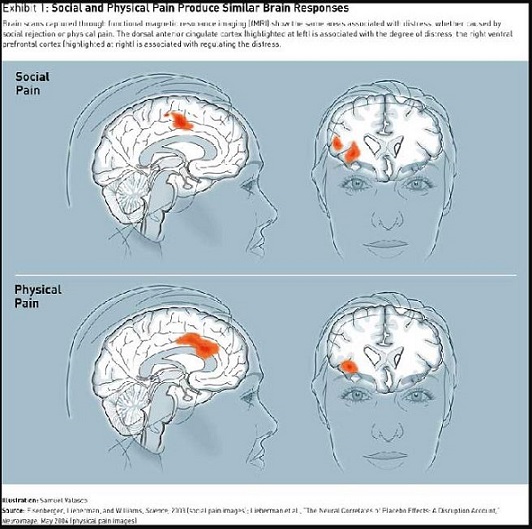The brain treats rejection like physical pain according to scientists

The Brain Treats Rejection Like Physical Pain, According to Scientists

Rejection is an experience that everyone has encountered at some point in their lives. Whether faced with rejection in relationships, job applications, or social groups, the emotional impact can be profound. Interestingly, the way our brain processes rejection is similar to how it responds to physical pain, according to researchers.
A study conducted by scientists reveals that the brain perceives social rejection in the same region where it processes physical pain. This astounding discovery has shed light on the complex nature of human emotions and how they are intertwined with our physical sensations.
The study, which was published in the journal “Science,” used functional magnetic resonance imaging (fMRI) to examine the brain activity of participants who experienced social rejection. The researchers found that the same areas of the brain associated with physical pain, such as the anterior cingulate cortex and the insula, were activated during experiences of rejection.
These findings suggest that the emotional pain of rejection is not solely psychological but also has a physiological component. When we feel rejected, our brain processes it as if we were experiencing physical harm. This explains why rejection can be so distressing and even debilitating for some individuals.
Moreover, the study found that individuals who were more sensitive to physical pain also experienced stronger reactions to social rejection. This implies that people who are more prone to physical discomfort are likely to be more affected by rejection in social contexts.
Understanding the brain’s response to rejection provides insights into why it can be so difficult to cope with and recover from such experiences. It also emphasizes the importance of social connections and acceptance for our overall well-being.

The link between physical pain and social rejection goes beyond mere subjective experience. Previous studies have shown that taking pain medications, such as acetaminophen, can reduce the emotional distress caused by rejection. These findings further support the idea that rejection and physical pain share common neural pathways.
The implications of this research extend beyond personal experiences of rejection. It highlights the need for empathy and compassion in our interactions with others, as social rejection can elicit genuine physical and emotional distress.
By recognizing the diverse ways in which the brain and body respond to rejection, researchers hope to develop targeted interventions and therapies. These could help individuals build resilience and cope with the emotional and physical challenges associated with rejection.
In conclusion, the study revealing the brain’s response to rejection as similar to physical pain provides a deeper understanding of human emotions. The findings offer valuable insights into the complex nature of rejection and its impact on our overall well-being. By acknowledging and addressing the physiological component of rejection, we can work towards creating a more empathetic and inclusive society.
Source: The Independent
Share
Related Posts
Quick Links
Legal Stuff

